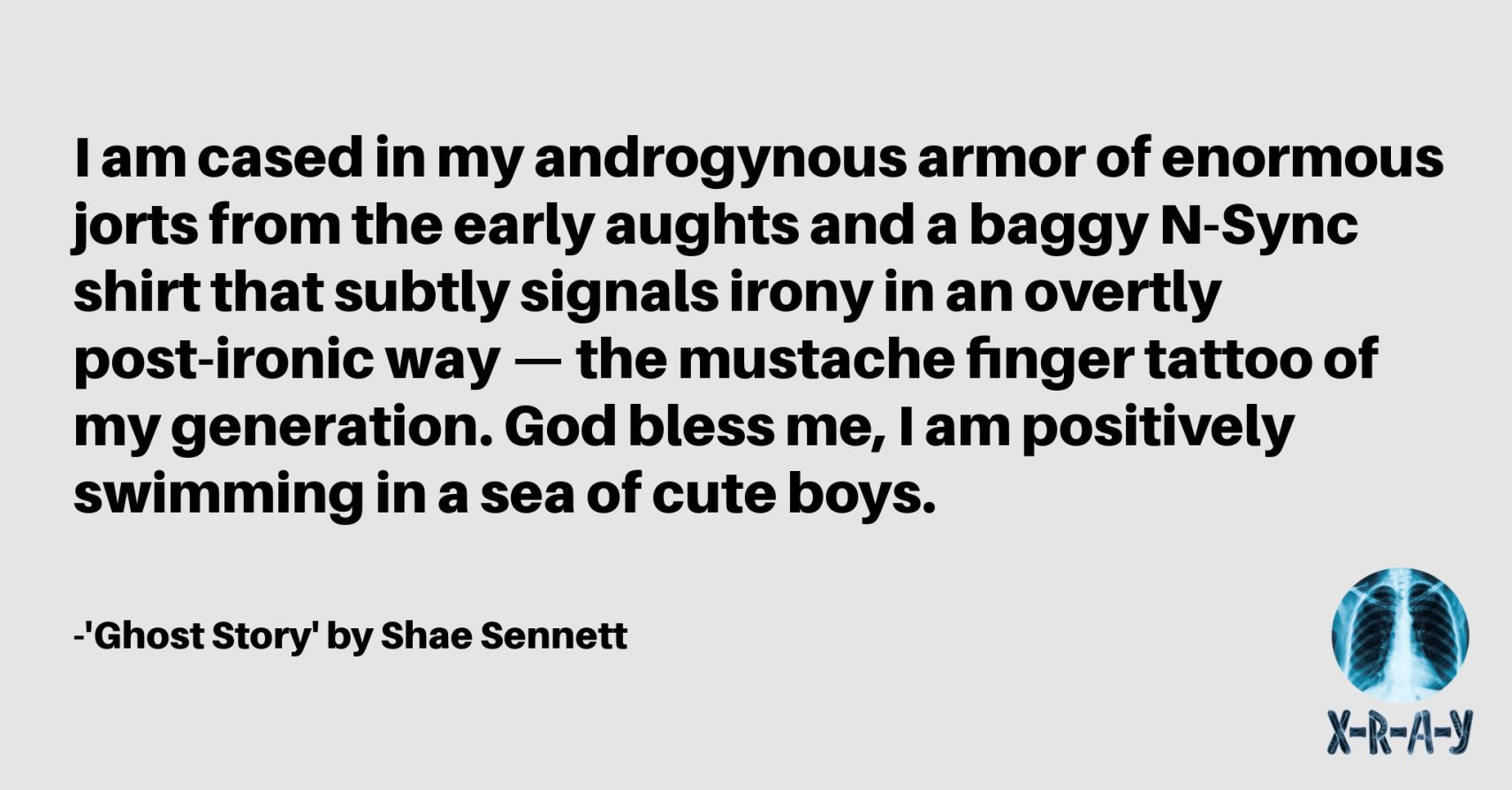

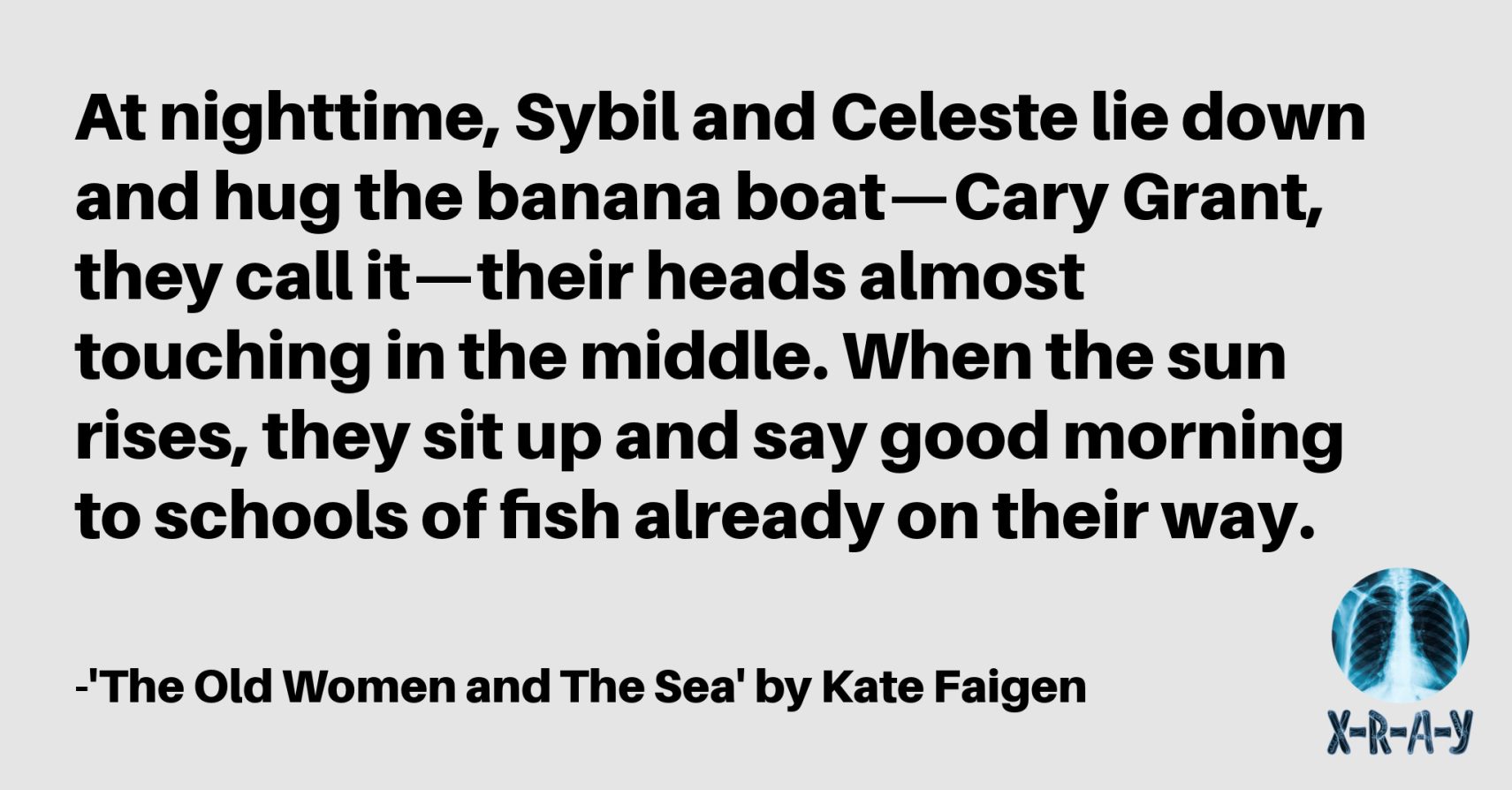
THE OLD WOMEN AND THE SEA by Kate Faigen
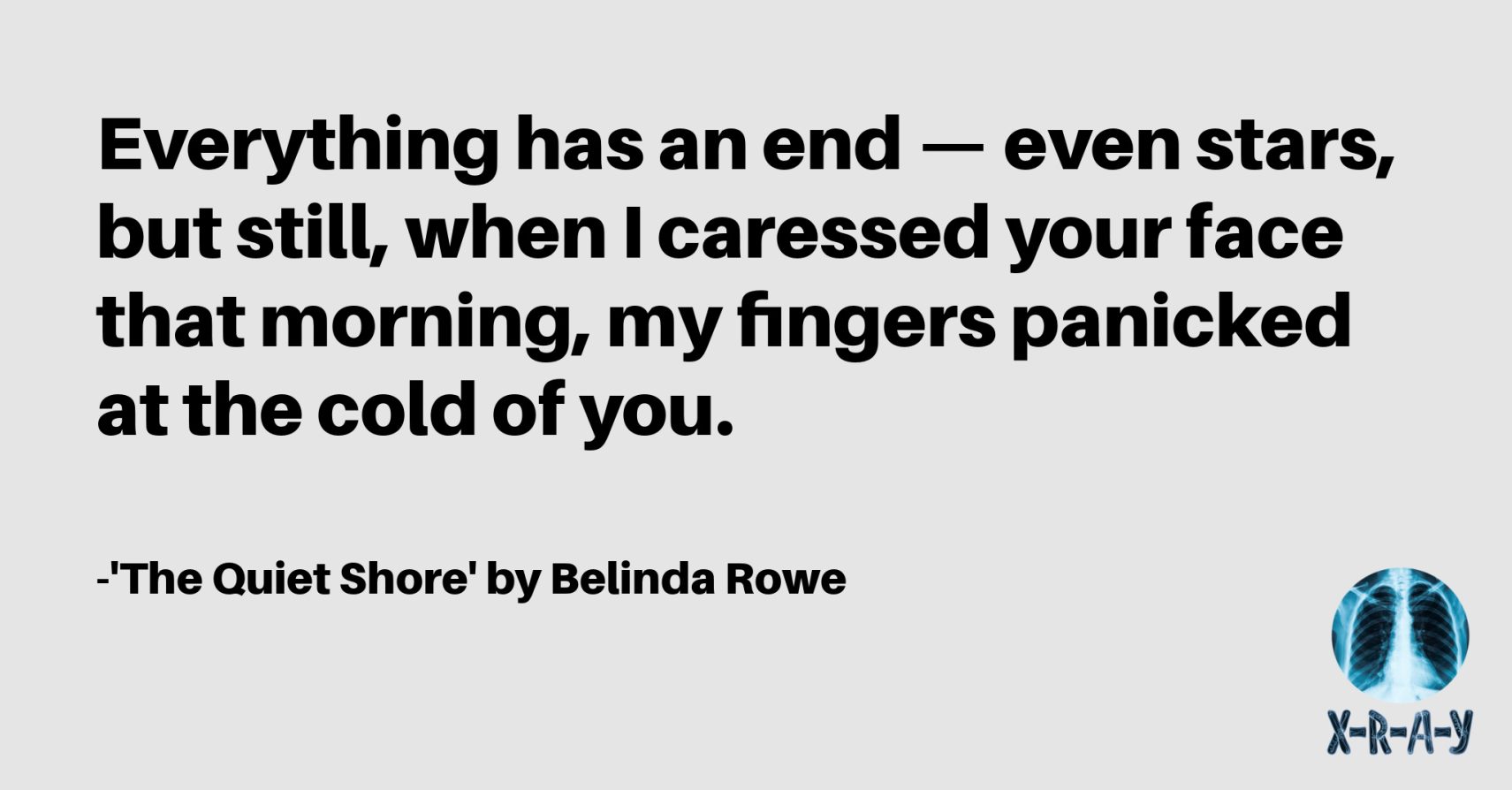
THE QUIET SHORE by Belinda Rowe
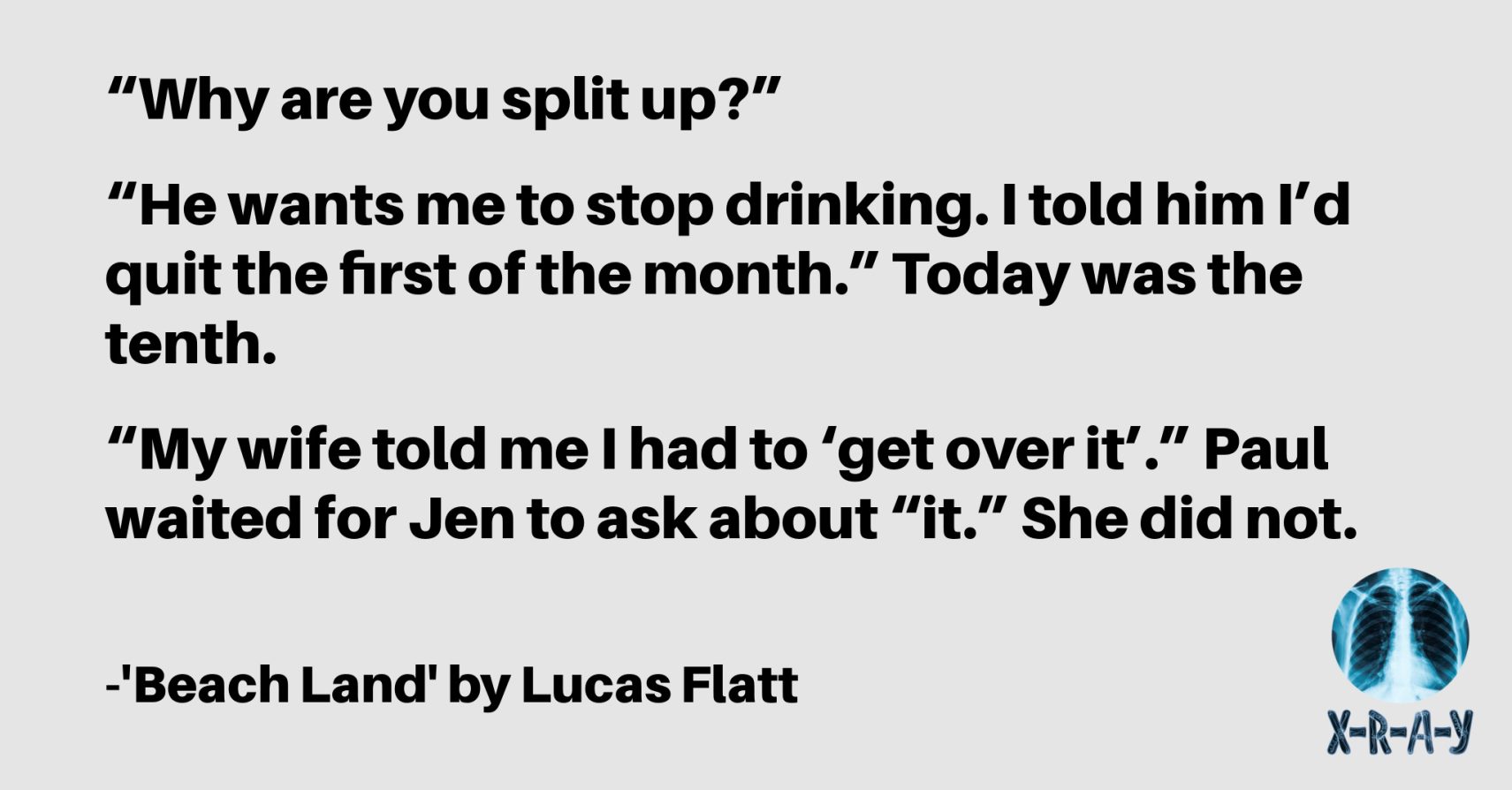
BEACH LAND by Lucas Flatt
***
By the pool, Paul still watched Gracie’s face in profile while she watched Marjorie swim with two brothers around her age, one probably younger and the other older by as much. She’d asked the boys to play; she’d ask anyone.Paul asked Gracie, “Why are you mad at me?” He couldn’t stop himself asking.“I’m not mad. Everything is fine.”If Paul ever heard the expression “everything is fine” again he vowed to pick a direction and run forever. Forever for his body would not be long or far, but he hoped his soul, such as it was, might propel then from his eyeballs and keep going at least a little farther.For now he climbed down the pool steps and swam to the deep end and floated there. And just as on each prior afternoon, he recognized that he did not care if he sank or emerged or simply dematerialized. “That’s my daddy,” Marj told the boys.This brought him back. He sang, “Do do, do do,” went under, holding one hand up vertical like a fin. When he caught hold of his daughter’s ankle, she didn’t squeal or kick. The thin bones of her ankles felt reedy and the clouds came across the sun and Paul closed his eyes and lay there long as he could, until she pulled away.***
On the pretense of buying ice cream for them all, Paul went down to the taco place across the parking lot from their condo and waited in a long line to order a drink. He’d been sober almost seven years. When the sandblasted Heidi asked his order, Paul teared up. She opened her gray eyes wide, as if to say, This isn’t the line for existential crises, and he ordered a rum and Coke. He never used to drink rum and Cokes. He’d drunk beer, which made him fat, which made him uglier.It occurred to him, squeezing into a stool at the far corner of the bar, away from the lines for drinks and tacos, that he might be feeling sorry for himself. That seemed possible. He took a sip. It helped, a little. The weight of the guilt of breaking another promise to Gracie never fell onto him. It just floated up there with the rest of it. A woman near his age took the empty seat beside him despite a good line of empty stools stretching back to the crowded part of the bar. “This seat taken?” She looked him dead in the eyes.“No.”She resembled his high school sweetheart, or at least how he imagined her twenty years later: small face shaped like a heart, round body, hair dyed an aggressive crimson, very tanned. Maybe local, though this bar seemed to be for tourists. She wore a Gov’t Mule t-shirt with the sleeves cut off. “I’m Jen.” “Paul.” They clinked their glasses. He took a bigger drink and the rum curled his lip. “Guh.”“Not much of a drinker?”“No. I always think I’ll like it. Whiskey.” He looked at his drink. “Rum. Whatever. It looks good on commercials.”She slugged her drink, which looked like rum without the soda, and smacked her lips. “Love it.”“It just tastes like what it is. Like you put corn or wheat or whatever in a barrel and left it there and forgot it and then came back and poured it in a glass.”“Well you got some soda pop in there. That should help.” She muttered something, maybe “pussy,” and killed her drink.“Did you call me a ‘pussy?’”She gave him another long look. “What if I did?”Paul considered this. He didn’t have an answer. He said, “I’m not,” but didn’t believe it.“Put your arm up,” Jen said. She slapped the bartop.“I’m sorry?” Paul pulled back on his stool.“Do it, pussy.” “Are we going to arm wrestle?”“You’re goddamn right.”He won without much effort, but when he’d pinned her hand they left theirs clasped on the sticky bar. Paul’s last clear thought before he made himself let go and take another drink was, Buddy, this is getting out of hand.***
They grunted and tried to dry-hump in the front seat of her SUV, some kind of Jeep, but didn’t fit well behind the steering wheel. Paul wished like Hell he’d look out over her shoulder and see Gracie likewise straddling some douchebag somewhere in the half-empty parking lot. Maybe also in a cobalt-colored Jeep. But all the Jeeps were empty save this one, steaming up.“Yes,” Jen stage-moaned.Her butt-bone dug into his thigh. “Shift a little,” Paul said.“Ooh.”“Uh huh.” Just as things became pleasantly frictive, Jen pushed back till she squashed against the wheel and said, "I don’t know if I want to.”This was a relief. “Me either,” Paul said. “I already feel guilty.”“Me, too. I'm married. We're separated. I came down here to spend my savings and drink myself to death, I guess. Like that Nicholas Cage movie.""Face/off.""Yeah." Jen reached down to the console for a pack of Camel Lights. "Let's just talk.""Ok. It's kind of hot in here.""I didn't mean dirty talk.""I wasn't.""Tell me something about yourself, Paul." She stayed on his lap and felt in her shorts for a lighter.Paul thought. "I always park in the same place at the grocery store so I don't have to look for my car.""That's honestly fascinating.""It is?""No, Paul. I wish you'd told me any other thing in the world."“Where’s your husband?” Paul tried not to sound peevish, but mostly everything he said these days did.“Home. Birmingham.”“Why are you split up?”“He wants me to stop drinking. I told him I’d quit the first of the month.” Today was the tenth. “My wife told me I had to ‘get over it’.” Paul waited for Jen to ask about “it.” She did not. “I think I want a divorce. I’ll probably tell her about this. That’ll do it.”“Don’t tell her.”Paul ran his hands through his hair. “I don’t know how not to.”“Just don’t.”“That’s the problem. I just do. Every little thing that bothers me, it’s like I have to. It burns in here if I don’t.” Paul rubbed his solar plexus."OK, tell her, then. Sounds like it won’t matter. Because I’m sure she didn't mean to marry a big whiny bitch." She slid into the passenger seat and lit her cigarette.Paul considered. “That’s probably true.”"She must be a profoundly strong woman to put up with you. You should run back to her fast as your mismatched legs can take you." "I forget my legs are different sizes."They both regarded Paul's legs. Jen frowned. "I'm afraid I never will." Paul coughed and popped open the driver’s side door. "Well, enjoy drinking yourself to death." He hung in the doorway, waiting for her snappy retort, but when none came he looked back at Jen's tight-lipped profile. She stared ahead at the sunset through the steamed-up windshield. This was a record, two women he'd put that long face on in a single afternoon.When he'd made it halfway to the cross walk toward the beach he looked back and saw Jen pouring the last of a bottle out of her window. She nodded to him and jumped the curb and screeched off toward highway 98.Or anyway that's what he pretended he'd seen, not looking either way at the intersection, just watching his legs carry him to the water.***
At the showers by the beach access were a few sandals and someone’s boogie-board leaning against a splintery railing. It wore the Tasmanian Devil and seemed too small for Paul, who stole it anyway. If he’d ever stolen anything before, he couldn’t recall it. He thought someone might shout for him to stop, but there was no one around.By sunset the beach was empty save the kid who rented chairs who stood up from his tented kiosk and welcomed Paul by name. “I just broke down your chairs,” he said, apologetic but not offering to set them back.Paul waved him off. “Thanks, Brayden.”“Hunter,” the kid said, still apologetic. Paul nodded and headed in. The tide was out and he had to walk a good way before the water reached his knees. One family watched him from the sandbar.He waded to the bar, went over into deeper water and began to float on the boogie board. The water was warm and he paddled out, unhurried, wondering how far he could get. There was some kind of fishing boat puttering along the horizon. When he looked back, the beach was far and someone–probably Brayden–stood cupping their eyes and looking out, probably at him. He waved; the person didn’t wave back.The waves came heavier and he had to hold on to the boogie board to keep it under his flabby torso. The family on the bar were looking out at something his way. Here it is, he told himself. It’s time. He really wanted another drink, shuddered away the image of Jen in her Jeep, glad at least not to have to explain that to Gracie, or anyone.Out of habit, he still imagined himself explaining, how he’d bring it up, what combination of words would yield which response. He didn’t know how to stop. But what he wasn’t imagining, despite blinking hard several times and wiping the salty haze from his eyes, despite truly hoping that he was, were the sizable dorsal fins trolling toward him from farther out to sea. The people on the sandbar shouted.“Fuck,” Paul said.The sharks neared. They circled, two fins, one significantly larger than the other, like a mother and child, perhaps. A father and child. He was going to die as some kind of hunting lesson for a shark.He held very still, but the circling closed and closed. He tried to pull himself up entirely on the beach board but the scrabbling only seemed to excite the sharks.He decided to try something. He lied to himself. Paul, you can fight off these sharks.It helped. He said out loud, “I’m OK. This is going to be alright.” And just before the shark clamped down on his leg–the smaller shark on the smaller leg–he finally had it, just a glimmering thought, but halfway to a plan that possibly might save his marriage.“Ah, fuck!” It really hurt.***
In the end, he did fight away the sharks. In his shrieking and flailing he kicked something several times. It didn’t fight back. He must taste bad, was the only logical conclusion. The sharks circled. They trailed away, possibly regrouping.When his panic ebbed, he felt himself and found what he guessed to be a decent tear in his calf. Blood came smokily up in the water rolling around his board.For once, his mind was truly blank. Then there was a great noise and he violently peed himself. It was an air horn blast. The fishing boat had spotted him in the dying light and shone some kind of spot his way. It trundled on. Somehow he knew the sharks were gone.Any semblance of life-altering epiphany had voided with his bladder. He let go of the board, slipped into the water with his eyes closed, and shouted away his air, his breath bubbling and his head immediately light. He was deep enough to turn all the way over and with his head facing down he kicked out his arms and legs and sank. He opened his eyes to the saltwater, expecting silty purple-black, but found instead a tawny haze. Then it was like he could breathe in some kind of air bubble, and in the golden light he saw someone, a person, smiling at him. A radiant woman. She wasn’t a mermaid. She had on a pastel blouse and very kind, pale blue eyes, and a gnarled hand with swollen knuckles reaching out for his. He took it. It was his mother, who he’d not thought about in maybe a week. She shook her head and held his hand. She looked into his eyes and then Paul rolled over into the purple-black and kicked up into the spotlight of the fishing boat.***
After the old couple had helped him aboard with a rope and a lot of undignified scrambling, his shorts halfway down his ass, his leg bleeding on the boat’s slick beige finish, Paul sat in the cockpit with blankets around him and a towel done up on his head. The old lady had gone somewhere out of sight looking for a first aid kid. The bite on his calf was curved and long as a hand.The old man, Hank, sat above him and worried with a radio. “We watched you for a while but you seemed like a strong swimmer. We didn’t think anything until we saw the sharks.”“That’s OK,” Paul told him again, touched, honestly, to be called a good swimmer. He loved compliments.“What were you doing out there?”He was cold. It was hard to remember. “I guess I meant to drown myself.”“Huh.” The old man, Hank, turned that over in his head. “Well, we could get you out past the sharks a ways and let you out.”The old woman, Joanne, was back in the cockpit with a box and flashlight. She gave her husband a long look, shaking her head. “God damn it, Hank.”***
The last of the sun burned out and the navigation lights glowed so that the horizon dimmed away and they were just rocking on the purple-black. It might well have been outer space.Hank gestured around them to the boat itself. He’d been extolling it for a while, Paul thought. They were borrowing it from a friend. “If we buy it, we get to name it, of course. What should we call her?”Paul knew without thinking. “Sweet bitch of the evening time.”Hank squinted at Paul, turning this too over in his head. “Did you say ‘time’ or ‘tide?’”“Tide.” Paul liked that better.***
Heading in, Paul played out what he would tell Gracie. He thought about seeing his mother and that she wanted to tell him something. What was it? What had he been thinking before the sharks attacked?“What was your name?” Hank asked.“Carlos.” He lied, and felt better, and it was coming back, the answer to everything. He leaned against the cockpit railing and closed his eyes. “Carlos Santoya. My folks are from Spain.”When the dock came into view Paul said, “Hey, I think I was just in shock before. I wasn’t really trying to drown myself.”“Oh yeah?” Hank frowned. “Nope. I was training. Boogie boarding. Walton County, regionals.”“Regionals?”“Oh yeah.” Paul nodded with big emphasis. More emphasis than he’d had in years. All of it, surging back.***
He came into the condo wild-eyed, angry for no reason that Gracie wasn’t waiting at the door, and found her on the couch, Marj sleeping with her head in her mother’s lap. Don’t blow it, he told himself, knowing that he was.She asked, “Are you OK?”“No. God, no. I need to go to the hospital.”She looked at his bandaged calf.“Did you get hit by a car?” “No!” Paul’s hands curled into fists, which Gracie hated.“You don’t have to.” She looked down at Marj, awake now, feigning sleep. “You don’t have to be an asshole. Where were you?”“It doesn’t matter. I need to go to the hospital.”“Let me see it.” Gracie reached for Paul who pulled back.“Not for that. Not that kind of hospital.”And they were fighting, and the girl was awake. Before Paul could get a handle on himself, she was carrying Marj into the bedroom, locking the door.***
That’s how Paul imagined it, provided the old Paul. The elevator smelled like cat urine and some kind of slime glazed the carpet. He braced himself at the door, punched in the code and slipped in quietly, limping, laden with ice-cream.Marj slept in the bottom bunk and he knelt there and tousled her hair.“Paul?” Gracie looked asleep, and scared, standing in the kitchen.“Sorry, babe. What a night!”“Where were you?”“Let’s get this in the freezer.” He limped there for effect. “I went to talk to Brayden about the chairs.”“Who? Hunter? The chair guy?”“Yeah, and there was all this pandemonium.”Only now did she seem to notice his limping.“Oh my God!”“People were running around. They were pointing at something in the water.”“Oh my God.”Paul closed the freezer. “There were some kids out there and this lady was just yelling, ‘Come back, come back,’ and people were watching. The lifeguard was dragging over a kayak or something.”“You went in?”“Well, I’m a pretty good swimmer. But it was just instinct. I didn’t really even know what was happening. I went in with my shoes and everything.” “You got bit by a shark?”“A little one.” Paul held his hands apart yay far.Gracie made some kind of squeal and wrapped him up. Marj climbed out of the bunk bed, mostly asleep, came dragging her blanket and wrapped up their legs.“Oooh, easy,” Paul said. But it didn’t really hurt. “Daddy’s a hero,” Gracie said. She was crying hard into his shoulder.“No, no,” he said. “It was the lifeguard who got the kids.”***
Later, with Marj back asleep and the ice cream containers stuck to the coffee table with the spoons standing up together, Paul and Gracie held each other on the couch.“I’m gonna fix everything.”She squeezed like maybe she believed him.“Oh yeah?”“Oh yeah.”She pulled back and put her hand on his collarbone, her eyes wet. “I want you to know, you don’t have to change yourself. You don’t need to be a different person for me to love you.”He pulled her in. “I know that.” He grinned over her out the balcony window. Lying felt better and better.She called him a hero again. He let her. “I guess I am,” he said. He tried to push away any kind of questions. The only one kept resurfacing was, what now? How does this end? Maybe that’s what his mother wanted to tell him. She’d seemed worried. That had been her way. But not now, maybe. Why should she? She was like a mermaid queen all gold and radiant in robes that billowed in the undertow, emerald scales. Or maybe she wasn’t. She’d just been his mother, underwater, quite unhappy. Her pale eyes pleaded. She was mouthing something, but there wasn’t any sound, of course, underneath all that water. Probably she’d wanted to tell him not to start this. You light it, you build it up, you’re glowing and you’re billowing, it seems like you’re coasting over, it seems like the answer, but when do you stop feeding the fire?He looked out into the dark toward the ocean where heaven must be. He wished he could tell her. It was OK. For once he had the answer. You never do. Not ever.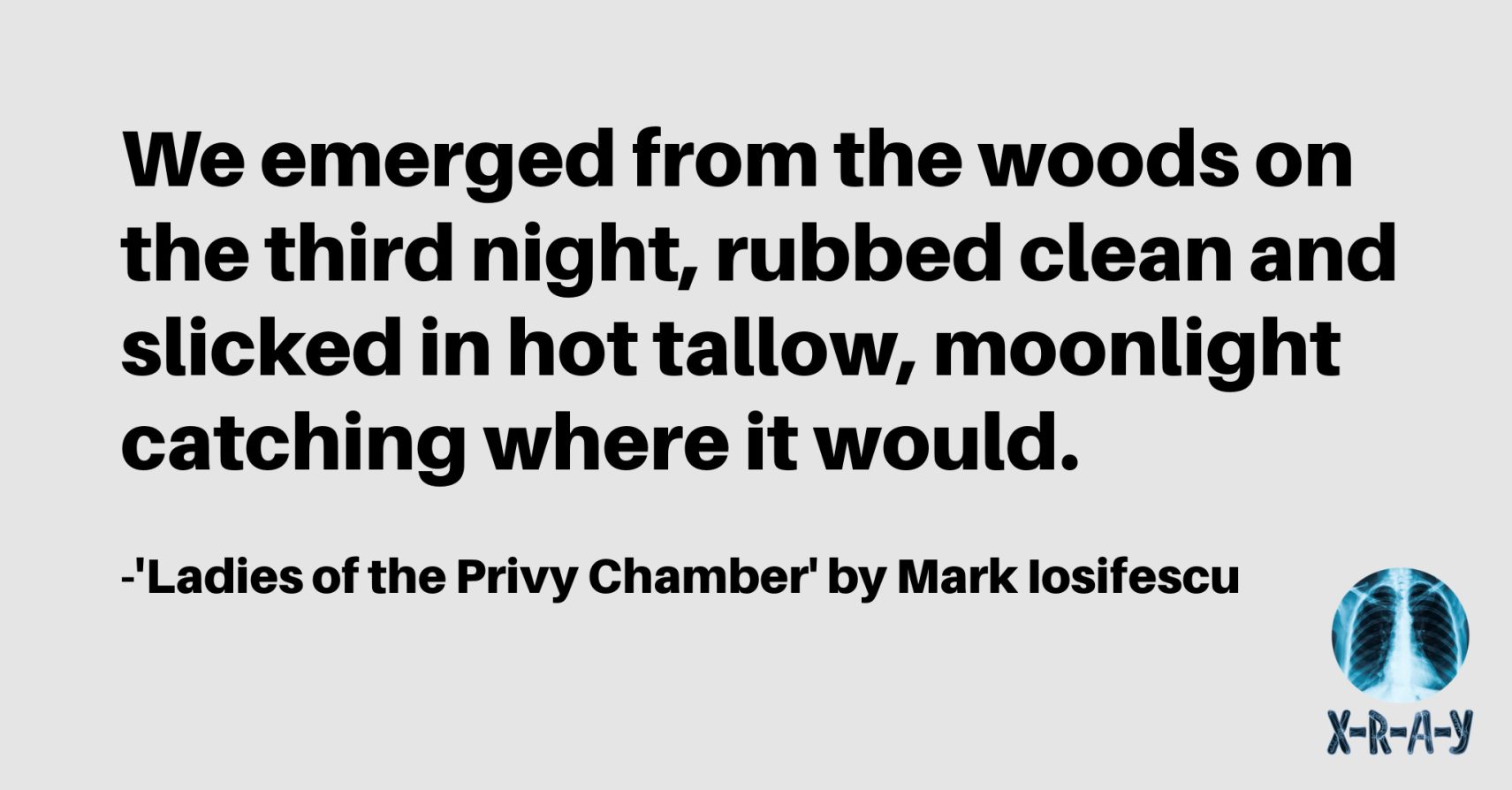
LADIES OF THE PRIVY CHAMBER by Mark Iosifescu
***
We emerged from the woods on the third night, rubbed clean and slicked in hot tallow, moonlight catching where it would. Each of us had drunk heavily from the consecrated sacks of wine, and as we sprinted through the dark, our breaths inside our masks resounded like wet slaps. The members of our detachment were giddy, lightheaded by the time we reached the clearing and fixed sights on the ruined stable.It was a four-cornered plot, patchily mown but much neater than what the townspeople had described, at whose center the smolderings of a recent campfire smoked beside some wire-lined animal hutches and a pair of shabby linen tents. Though the intervening distance was largely obscured by darkness, we’d taken care to reconnoiter the whole of the field during the prior days of close observation. We knew exactly where to be.We squinted through the loose, flappy eyeholes, trying to bypass the smoke from the camp while our visions adjusted. Finally, at the clearing’s far edges, we saw them: our Sisters, in all their finery, standing stock still. Shapely forms, angles all glistening, fleshly knots of curve and slick straightaway culminating at their necks, where the fearsome glory of the masks slipped over the top like a churchmaid’s headdress. Gazing at them, noting their formidable bodies against the dark, their towering nakedness, the easy dominance of their stance, we felt rushes of pleasure. We loved the idea that this was how we looked. We howled the signal across the clearing. The other detachment howled back its readiness. And together we moved in.We found Puccio in the larger tent, asleep on a pallet of loose cloth and hay, a small earthenware bowl balanced on his sweaty belly. In the corner, a clatter of personal items: sacks of food, sheep shears and farming utensils, a bridle, a guitar, other pieces of frippery. Beside these, a corpulent sow lay snoring facedown, a dozen or so fussy piglets vying for access to a single exposed teat.“Peace?” When he woke, Puccio’s voice was high, tentative, trembling. He couldn’t see us yet, but he knew someone was there.“Shhh,” we answered.We bound him to the tentpole with his bedclothes. Within a minute or so we’d commandeered the rusty shears and started in on his long, greasy hair. On account of our not having gagged him, he made a lot of noise at first—shrill, ribboning sounds that seemed to aggravate the nearby animals, some of whom we could hear neighing and stomping fitfully from their hutches outside. But everyone soon calmed down, and by the time we completed his shave, Puccio had become docile, accepting, eyes sort of passively unfocused as he gazed into our false faces. It was as though, in feeling the monastic tonsure we’d cut out of his crown, he’d begun to intuit his role.The assault on the chapel and the breaking of the town would require, we knew, another animal of sufficiently encrusted contempt. We asked after the ones in Puccio’s care: their number, the nature of their ailments, the causes of their abandonment. It turned out he kept an ancient pack donkey named Cephas who’d been worked to lameness by a village farmer, beaten badly and left at the edge of town. The creature couldn’t walk or even stand, having developed enormously inflamed hoofs; it also suffered from infections along its flanks, where it frequently worried the flesh and bit itself raw. It would be dead by Sunday.“Can the animal be transported into town?” Our speech flowed slow, slurred almost to indecipherability; the night was heady, and our voices caused the air to warp inside the tent.But Puccio nodded easily. “I can use the old stable van,” he said. “It made it through the fire in good shape. Two horses should be enough to pull it.”We smiled beneath the masks, petting the halo of locks we’d left intact along the rim of his skull. Puccio’s cheeks were clammy, and a steady, obedient pulse could be seen beating out from a notchpoint at his temple while we whispered instructions into his ear. Our little monk.***
That weekend, the chapel was full, the sabbath having drawn the attendance of nearly every townsperson: the church officials, of course, but also the midlevel nobles, all manner of working folk, indigent passersby. Sneering shopkeepers lined the benches beside combative drunks, shameless propagandists and wifebeaters, sanctimonious elders and loudmouth zealots. The merchants who’d shown us the way to Puccio’s camp were also visible in a front pew, their skinny, dour families crumpled beside them. They didn’t recognize us in our disguises, but we knew everyone, and as we scanned the room a hot feeling of anticipation moved through our centers.The portly priest stood, and his painted throne heaved a sigh. Though he wore the highly decorated garb of his order—the ornately-woven sackcloth and cuffs, the heavy pendants and jewelry, the bulbous crown of damask and gold cloth—he resembled nothing so much as a bloated pigeon.He began his invocation, turning toward the altar and chanting in a low voice while a pair of punctilious aides bobbed along the perimeter with perfume censers. The congregants picked up their end of the chants indifferently, eventually finding a sort of delicate unison, one filled with subtle desynchronizations and flatnesses of tone, with distracted murmurs and slow lullings. Human voices, shabby and drifting; testaments to impoverished, complicit spirits, to lifetimes of violent disregard. And our miracle, sudden and senseless, coming to free them.We closed our eyes, listening as the crowd thrummed and droned toothily, and thought of the instructions we had given the stableboy, that night in the tent beside the broken stable. “You might imagine it as a doorway,” we’d said, directing his lolled-over head toward the small symbol we’d painted in the dirt: a loose oval, an egg shape, rendered in the darkened purple of our upchucked wine. The ritual, we explained, required that the symbol be wordlessly pondered, fixed on with concentration, revivified in the incorruptible space of one’s steadfast attention and enlarged, slowly and carefully, to a greater and greater stature. To the size of a key. To the size of a knob. To the size of a door.“Carefully look over the door in your imagination.” Puccio’s hands had been tied, fingers outstretched, bloodless white. Tears on his cheeks as he nodded.“Now open the door.”At that moment, a crash was heard from the chapel’s entranceway.We opened our eyes just as an enormous shape skidded across the floor. The broken donkey, lobbed deadweight into the center of the space. A terrible smell filled the air.“If you wish to fatten up on blood,” a voice said, “then spill it in sight of the throne.”A hush had fallen, but as soon as the congregants could see who was speaking, the tone changed again. People scoffed, rolled their eyes. More than one attendee gestured to their neighbor, indicating the speaker’s clerical haircut with ridicule.“Stableboy.” From the altar, the priest snorted. “Are you good?”Puccio entered, his head low. Stubbly patches had begun growing back in across his scalp the last few days, little crusts of dirt and bunchups of dead skin along the crown, along his neck and thin forearms and the furled hideaways beneath his threadbare tunic. He looked beleaguered, filthy, abject, the way they thought of him. But his smile was clean.Looking up, he loosed a stream of curses, of invective, of magic in the old style. Probably he spoke of youth and humiliation, of unspeakable memory made concrete if not quite knowable—the details of what was said being academic, really, where actual practice is concerned. Nothing to relate about his words that isn’t irrelevant, not so much paltry or inadequate as altogether meaningless when conceived in context, amid generations of injustice, of massed mourning, of increments of voltage accumulated, held, and discharged, finally, in a single paroxysmal move. Of what consequence is language, anyway? We’re talking about action here.Instantly, the building itself seemed to slip out of phase. A chair snapped and splintered of its own. A mother wept, staring at her baby. The flames in the censers leapt their containers, and the shocked aides dropped the vessels to the floor. The donkey’s hoofs began to twitch.Puccio had been speaking continuously as he came up the aisle. “If you want to feed your gods on sacrifice,” he said, “then take a look at what it is they actually eat.”Probably nobody heard him. The crowd pressed against itself, flexing and roiling, falling into the walls and the locked doors. The flames from the censers spread slowly, inching themselves along the timber floorplanks, fingering the tassels on the woven rugs. We stood, calmly, irrevocably, and in one move, cast off our disguises and revealed our true faces. Cries, prayers, panic. Behind us, the merchant with the broken teeth, desperately avoidant of our sightline, was trying to climb the masonry, scrambling over his family, knocking over icons and paintings.In the cleared central space of the room, the donkey wiggled a leg, pressed on it tentatively, and rolled onto its feet. It breathed steady amid the building smoke, rocking back and forth for a moment, then reared up on its hind legs and, with an unbidden bray of pleasure, began to cross and uncross its forelimbs. It stood on one hoof then the other, trotting and shuffling, circling the burning chapel decorously. With a stately tempo, it danced a processional for the end of services.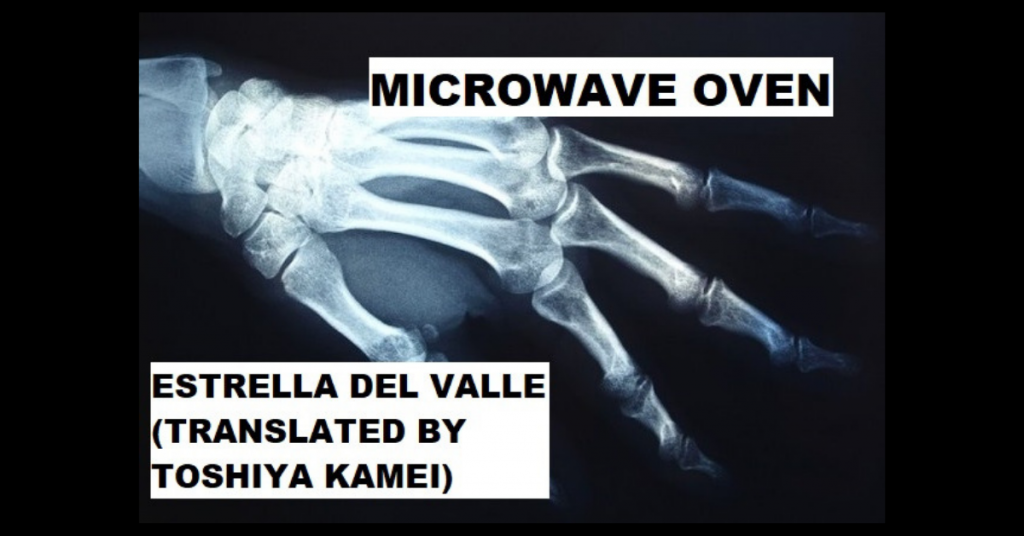
MICROWAVE OVEN by Estrella del Valle (translated by Toshiya Kamei)
Don't say my name, don't say my name, when you know I have died, don't say my name.
-Roque Dalton
I don't know how it happened. I only remember walking in the woods with my strawberry basket. I wanted to pick a lot of strawberries on the way because my grandmother likes homemade cakes. She used to make them before she bought her house and had to spend many hours outside. She made them with egg white foams. The secret is to beat yolks and butter well, first yolks, then butter, and whip it for a long time, pour in the mixture of flour and milk. Finally make half of the egg whites fluff up. It's easy, no? She cuts the sponge cake horizontally in thirds with a thread and on the first layer she puts walnut custard, made with real walnut, strawberry jam, made from natural strawberries, not the kind you find in a supermarket. Then she puts the last layer, which she bakes in the oven. She starts decorating it with meringue. She makes a lot of figures, roses, leaves, and faces. She can even put the birthday person's name with one hand. She's an artist. I kept walking, looking for strawberries for her cake, but I didn't find any. That's why when I saw you coming in. I thought you were a doll, dressed up like that, so elegant. You even look like Ken, Barbie's boyfriend. Then I thought you came for my grandma's cake. But I know that man sent you here. Well, tell him no. I'm tired of playing house. Like I said, I'm sick of playing husband and wife. I lost interest in cooking a long time ago, after the day when I was so hungry I went to look for strawberries for the cake and couldn't find the woods anywhere. Nobody knew where the woods were. I was tired of asking directions, so I left and walked along Broadway, from West College to Seventh Street. I kept walking with my basket until it became dark, and I didn't know how to get back home. When I realized I was lost, I thought about going back the same way, but I hadn't left breadcrumbs because with this husband we never had enough bread to put into our mouths. When we got married, my dad told him, "Take good care of my little princess." That's what my dad told him, but he didn't even listen. I walked to Seventh and arrived at St. Vincent Jewelry Center. I wanted my princess tiara to go back to my house, to my dad. I went to the tiara display counter with my empty basket. The saleswoman and other women stared at my tattered clothes and bleeding toenails. I was bleeding all over the blue carpet, my blood, which wasn't blue like the carpet, kept oozing. I don't know how it happened, the lights went out, then screams came. I don't remember anyone coming to my rescue with his sword and white horse. Only you have showed up here, with your doll-like face, your well-ironed suit, and your CD on your back that repeats the same promise you'll never keep because he doesn't want to see me. I want you to know this once and for all. I don't need him anymore because the doctor, who likes me, told me if I continue to be a good girl, as I have been, he'll buy me Barbie's microwave oven, with its flour and all the dishes for the cake.

REFILL by Fernando Schekaiban (translated by Toshiya Kamei)
Here I am again, in this café that has transformed into a shelter of excuses. I don't know why I come back here every week. But I know myself and my pretexts. Some say I'm patient – those who value me the most – while others call me nuts. I'd say I'm in love with the sound my favorite chair makes – the one in the only corner available to customers – when you drag its wooden legs. OK, the chair is not the recipient of my love, nor is my visit to an "overcrowded" place, which allows me to listen to every sip of my coffee. The truth is, this place is becoming increasingly sadder: without people – like our relationship – with worn tablecloths and uneven coffee stains – like the echoes of my affectionate words – and with such a bad service – like her – that forced me to choose another flavor of my own resonant coffee today.
I waited for her here every week. She never showed up at the hour I expected, always a cup or two late. Did she have excuses? The first time she came, the refill of my café Americano cost me extra. She took the seat in front of me, and without offering an excuse, she asked for a menu to cover those eyes I had fallen in love with. But I was so annoyed – for having to pay for the extra coffee – that I paid my bill and left. The word "nuts" rumbled through my head. But I shouldn't let it get to me. I know we'll see each other again.
On the second date, I was dragging the chair that wasn't really mine – Forgive us, but we can't ask the other customers to avoid sitting where they want – because they would talk about the curses that the use of my things would bring upon them. She looked into my eyes from the entrance, with that strange grimace that forces her to knit her eyebrows and press her lips together, and took three steps... toward the exit. I thought about following her, asking her forgiveness for my behavior, but I heard the sound of the chair getting out of hand. There will be a third time, I told myself.
After the third, fourth, and fifth occasions, I jokingly told myself that our dates were my refills. Even today – patient – I know I'll find a new excuse – nuts – while I hear you sip your coffee. Sometimes in front of me, one or three tables away; at other times at the entrance when you first look at the place and notice that it's not to your liking; at some other times, when I still believe in love at first sight, but I can't bring myself talk to you.
